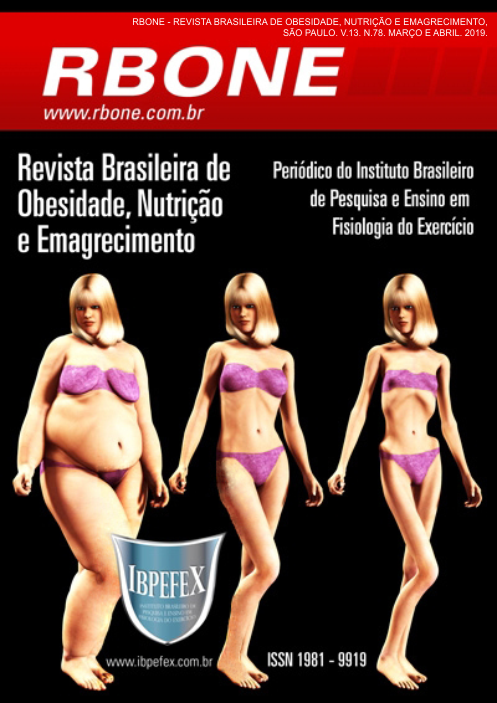Evaluation of knowlegde level and nutritional state of post-bariatric patients
Abstract
The bariatric surgery is an alternative treatment for patients with morbid obesity and/or who have complications from obesity. However, i order to be sucessful the patients must follow a nutritional orientations protocol before and after the surgery. This is a cross-sectional descriptive research which aims to evaluate the nutritional state of post-bariatric patients, as well as their nutritional knowlegde level about particularities of the surgery and the occurrence of complications related to their diet after the surgery in order to identify if these patients were well oriented and if they adhere to the indicated treatment. Were selected 317 post-bariatric patients in the age range of 19 to 61 years old, who had at least 15 days of operated. The data were obtained through a nutritional knowlegde level digital questionnaire and after analysis it was possible to observe improvement in the life quality of the participants due to the average weight loss of 40,65 kg ± 2,41 and a BMI reduction of 15,16 kg/m² ± 0,26, which consequently, resulted in the improvement of comorbidities related to obesity. Besides that, it was seen that 14,19% (n=45) presented some diet related complication, and in relation to the nutritional knowlegde level, most of the participants was aware about the given orientations, however, not all of them follow it correctly, leading to weight regain and diet related complications. It is concluded that bariatric surgery can improve the life's quality of people with obesity, since there's adherence to the orientations given by the multidisciplinary team.
References
-Associação Brasileira para Estudo da Obesidade e da Síndrome Metabólica. Diretrizes Brasileiras de Obesidade. São Paulo. 4ª edição. 2016.
-Bardal, A.G.; Ceccatto, V.; Mezzomo, T.R. Fatores de risco para recidiva de peso no pós-operatório tardio de cirurgia bariátrica. Scientia Médica. Vol. 26. Num. 4. 2016.
-Barros, L.M.; Moreira, R.A.N.; Frota, N.M.; Caetano, J.A. Mudanças na qualidade de vida após a cirurgia bariátrica. Revista de Enfermagem UFPE online. Vol. 7. Num. 5. 2013. p. 1365-1375.
-Batista, M.F.; Souza, A.I.; Miglioli, T.C.; Santos, M.C. Anemia e obesidade: um paradoxo da transição nutricional brasileira. Caderno de Saúde Pública. Vol. 24. Num. 2. 2008. p. S247-S257.
-Frota, N.M.; Barros, L.M.; Moreira, R.A.N.; Araújo, T.M.; Caetano, J.A. Avaliação dos resultados da cirurgia bariátrica. Revista Gaúcha Enfermagem. Vol. 36. Num. 1. 2015. p. 21-27.
-Loss, A.B.; Souza, A.A.P.; Pitombo, C.A.; Milcent, M.; Madureira, F.A.V. Avaliação da síndrome de dumping em pacientes obesos mórbidos submetidos à operação. Revista do Colégio Brasileiro de Cirurgiões. Vol. 36. Num. 5. 2009. p. 413-419.
-Luz, D.M.D.; Encarnação, J.N. Vantagens e desvantagens da cirurgia bariátrica para o tratamento da obesidade mórbida. Revista Brasileira de Obesidade Nutrição e Emagrecimento. Vol. 2. Num. 10. 2008. p. 376-383.Disponível em: <http://www.rbone.com.br/index.php/rbone/article/view/99>
-Morales, C.L.P.; Alexandre, J.G.; Prim, S.; Amante, L.N. A comunicação no período perioperatório sob a ótica dos pacientes submetidos à cirurgia bariátrica. Teto Contexto de Enfermagem. Vol. 23. Num. 2. 2014. p. 347-355.
-Nibi, F.A.; Osti, C. Cuidados intensivos no pós-operatório imediato de cirurgia bariátrica. Revista UNINGÁ. Paraná. Num. 39. 2014. p. 149-158.
-Rosa, S.C.; Macedo, L.S.; Casulari, L. A.; Canedo, L.R.; Marques, J.V.A. Perfil antropométrico e clínico de pacientes pós-bariátricos submetidos a procedimentos em cirurgia plástica. Revista do Colégio Brasileiro de Cirurgiões. Vol. 45. Num. 2. 2018. p. 1613.
-Sociedade Brasileira de Cardiologia. 7ª Diretriz Brasileira de Hipertensão Arterial. São Paulo. Vol. 107. Num. 3. 2016.
-Sociedade Brasileira de Cirurgia Bariátrica e Metabólica. A Cirurgia Bariátrica. 2017a. Disponível em: <https://www.sbcbm.org.br/a-cirurgia-bariatrica/>. Acesso em: 16/04/2018.
-Sociedade Brasileira de Cirurgia Bariátrica e Metabólica. Técnicas Cirúrgicas. 2017b. Disponível em: <https://www.sbcbm.org.br/tecnicas-cirurgicas/>. Acesso em: 16/04/2018.
-Sousa, K.O.; Johann, R.L.V.O. Cirurgia bariátrica e qualidade de vida. Psicologia Argumento. Vol. 32. Num. 79. 2014. p. 155-164.
-Sutil, D.; Huth, A. Complicações nutricionais no pós-operatório de cirurgia bariátrica. Monografia. Trabalho de Conclusão de Curso. Rio Grande do Sul. 2012.
-Tavares, R.S.; Silva, D.M.G.V.; Sasso, G.T.M.D.; Padilha, M.I.C.S.; Santos, C.R.M. Fatores de riscos cardiovasculares: estudo com pessoas hipertensas de um bairro popular na região amazônica. Ciência, Cuidado e Saúde. Vol. 13. Num. 1. 2014. p. 4-11.
-Venzon, C.N.; Alchieiri, J.C. Indicadores de Compulsão Alimentar Periódica em Pós-operatório de Cirurgia Bariátrica. Psico. PUCRS. Vol. 45. Num. 2. 2014. p. 239-249.
-Zeve, J.L.M.; Novais, P.O.; Oliveira, N. Jr. Técnicas em cirurgia bariátrica: uma revisão da literatura. Revista Ciência & Saúde. Porto Alegre. Vol. 5. Num. 2. 2012. p. 132-140.
Authors who publish in this journal agree to the following terms:
- Authors retain the copyright and grant the journal the right of first publication, with work simultaneously licensed under the Creative Commons Attribution License BY-NC which allows the sharing of the work with acknowledgment of the authorship of the work and initial publication in this journal.
- Authors are authorized to enter into additional contracts separately for non-exclusive distribution of the version of the work published in this journal (eg, publishing in institutional repository or book chapter), with acknowledgment of authorship and initial publication in this journal.
- Authors are allowed and encouraged to post and distribute their work online (eg, in institutional repositories or on their personal page) at any point before or during the editorial process, as this can bring about productive change as well as increase impact and impact. citation of published work (See The Effect of Free Access).






